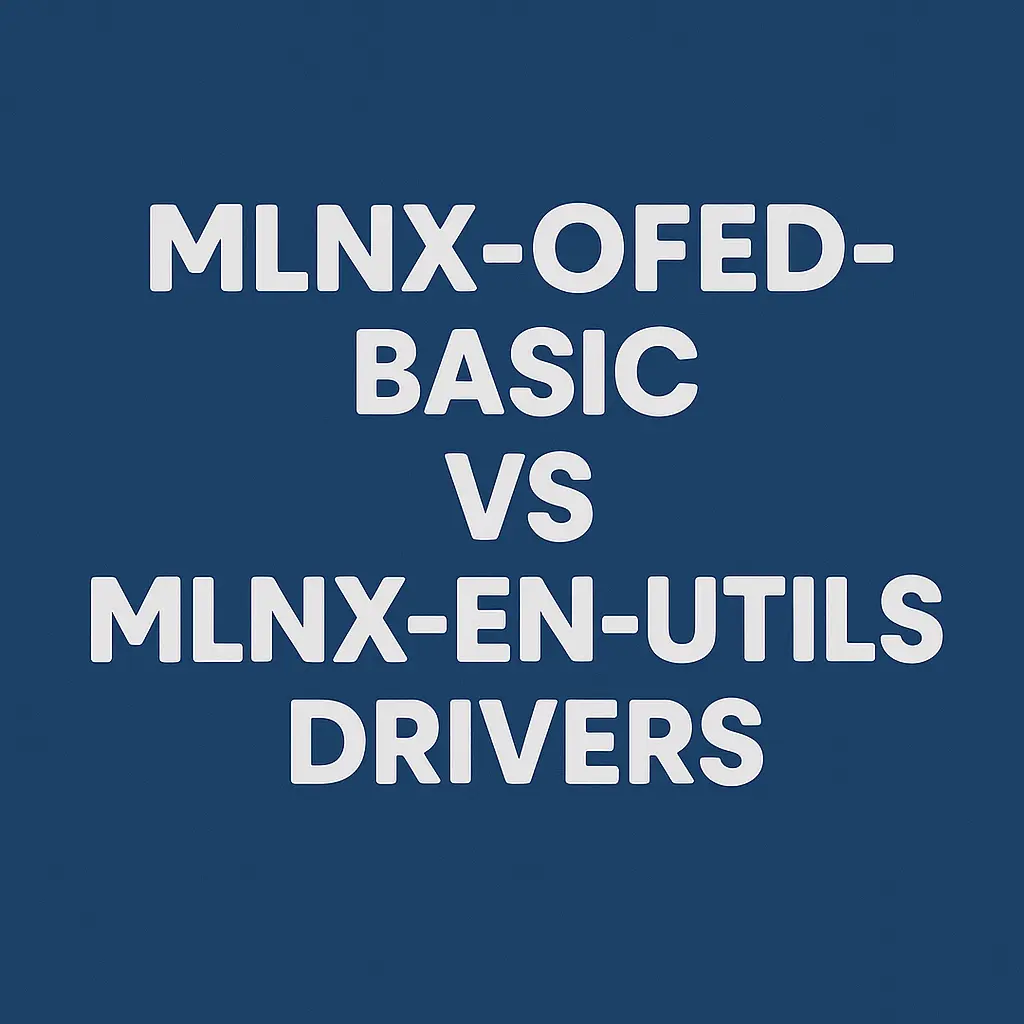MLNX-OFED-Basic vs MLNX-EN-Utils: Choosing the Right Driver

NVIDIA Mellanox networking adapters require appropriate drivers for optimal performance. Two primary driver packages exist: MLNX_OFED (including mlnx-ofed-basic) and MLNX_EN (including mlnx-en-utils). Understanding their differences helps you select the right driver stack for your infrastructure requirements.
What is MLNX_OFED?
MLNX_OFED (OpenFabrics Enterprise Distribution) is the comprehensive software stack from NVIDIA for Mellanox network adapters. The mlnx-ofed-basic package is a meta-package that installs the core components of this full-featured driver suite. It supports both InfiniBand and Ethernet interconnects using RDMA and kernel bypass APIs called OFED verbs, providing performance up to 400Gb/s for InfiniBand and RoCE.
What is MLNX_EN?
MLNX_EN is a lightweight driver package designed specifically for Ethernet-only deployments. The mlnx-en-utils package provides utilities and tools for managing Mellanox Ethernet adapters without the full InfiniBand and RDMA stack overhead.
Key Differences
Scope and Features:
- mlnx-ofed-basic: Full InfiniBand and RDMA support including OpenSM (subnet manager), ibverbs-utils, infiniband-diags, SRP/iSER drivers, and comprehensive RDMA libraries
- mlnx-en-utils: Ethernet-focused drivers and utilities without InfiniBand components
Package Size:
- mlnx-ofed-basic: Larger installation with complete networking stack
- mlnx-en-utils: Smaller, streamlined package for Ethernet-only environments
RDMA Support:
- mlnx-ofed-basic: Full RDMA capabilities with verbs API for high-performance computing and storage
- mlnx-en-utils: Optional RDMA support via libibverbs extension if needed for RDMA-based applications
Use Cases:
- mlnx-ofed-basic: HPC clusters, AI/ML training workloads, storage systems requiring RDMA, InfiniBand networks
- mlnx-en-utils: Standard Ethernet deployments, cloud infrastructure, general-purpose networking
Installation
For MLNX_OFED installation on Ubuntu/Debian:
wget https://linux.mellanox.com/public/repo/mlnx_ofed/latest/ubuntu20.04/mellanox-mlnx-ofed.list
sudo mv mellanox-mlnx-ofed.list /etc/apt/sources.list.d/
wget -qO - https://linux.mellanox.com/public/repo/mlnx_ofed/GPG-KEY-Mellanox | sudo apt-key add -
sudo apt update
sudo apt install mlnx-ofed-basic -y
For MLNX_EN installation:
wget https://linux.mellanox.com/public/repo/mlnx_en/latest/ubuntu20.04/mellanox-mlnx-en.list
sudo mv mellanox-mlnx-en.list /etc/apt/sources.list.d/
wget -qO - https://linux.mellanox.com/public/repo/mlnx_en/GPG-KEY-Mellanox | sudo apt-key add -
sudo apt update
sudo apt install mlnx-en-utils -y
Verify driver installation:
ibstat # For MLNX_OFED
ethtool -i <interface_name> # For both
Operational Tips
- Performance requirements: Use MLNX_OFED for latency-sensitive workloads requiring RDMA
- Driver updates: MLNX_OFED receives latest features and optimizations for Mellanox hardware
- Compatibility: Check kernel compatibility matrix before installation
- Transition planning: MLNX_EN last standalone release is October 2024 LTS (3-year support); new features after January 2025 will only be in DOCA-Host profiles
- Inbox drivers: For minimal installations, consider inbox drivers included with Linux distributions
Which Driver Should You Choose?
Choose mlnx-ofed-basic if:
- Running InfiniBand networks
- Requiring RDMA for HPC, AI/ML, or storage workloads
- Need latest performance optimizations and features
- Running RoCE (RDMA over Converged Ethernet)
Choose mlnx-en-utils if:
- Using Ethernet-only deployments
- Want minimal driver footprint
- Don't require InfiniBand or RDMA capabilities
- Prefer lightweight installation for cloud environments
Future Direction
NVIDIA is transitioning from standalone MLNX_OFED and MLNX_EN packages to DOCA (Data Center Infrastructure On a Chip Architecture). The MLNX_EN package will receive support until October 2027 (3-year LTS), but new features after January 2025 will only appear in DOCA-Host profiles. Plan your infrastructure upgrades accordingly.
Conclusion
Understanding the differences between mlnx-ofed-basic and mlnx-en-utils helps you optimize your network infrastructure. MLNX_OFED provides comprehensive InfiniBand and RDMA support for high-performance workloads, while MLNX_EN offers a streamlined Ethernet-focused solution. For intelligent incident management and automated issue resolution, consider using Akmatori, an open-source AI agent platform that helps SRE teams respond to infrastructure incidents faster.
FAQ
Can I switch from MLNX_EN to MLNX_OFED later?
- Yes, but you must first remove the MLNX_EN package completely before installing MLNX_OFED to avoid conflicts.
Does MLNX_EN support DPDK?
- Yes, MLNX_EN includes what is needed for DPDK (Data Plane Development Kit) applications.
What are inbox drivers?
- Inbox drivers are Mellanox drivers included with the Linux kernel distribution. They provide basic functionality without requiring separate installation but may lack the latest features.
